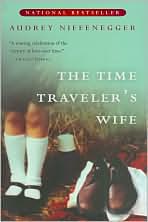 In Audrey Niffenegger’s The Time Traveler's Wife, Henry DeTamble has a disease called Chrono-Displacement Syndrome. It makes him time-travel. Henry can't control it; it mostly happens when he's feeling stress or going through some emotional turmoil. He has utterly no control over where or when he's coming or going. He doesn't know anybody else who has this disease.
In Audrey Niffenegger’s The Time Traveler's Wife, Henry DeTamble has a disease called Chrono-Displacement Syndrome. It makes him time-travel. Henry can't control it; it mostly happens when he's feeling stress or going through some emotional turmoil. He has utterly no control over where or when he's coming or going. He doesn't know anybody else who has this disease.Sometimes, he'll appear in a time and place where he already exists; he can interact with a younger or older version of himself. Many times his travels take him to the same event in time, like a treasured moment with Clare, the titular wife. Clare has known Henry since she was 6 and because Henry has time-traveled numerous times to visit after he first "met" Clare when he was 28 and she was 20.
The book opens with the scene where Henry, working at the Newberry Library in Chicago "meets" Clare for the first time. Henry of the present has no clue who Clare is. Future Henry has been careful not to tell anybody in the past, including his past "selves," about the future because Henry is afraid to contemplate the nature of fate. This creates a tension for a the reader who knows in bits and pieces of things that occur in the time continuum for Henry. We are time-traveling not just with one Henry, but many Henrys, because each Henry at any point in time can be displaced.
Henry's fear has to do with determinism: the past, present and future has already happened and there is no way to alter the course. What you do now has changed your future and if you travel from your future to your past, it has changed the present. There is no paradox. By not telling his past selves what happens in the future, they can live in the knowledge and/or illusion that they have some "control" over their destinies.
Of course, my only experience with determinism was when a guy I was going out with had foreplay, sex and climax all at the same time before I had taken my shirt off. Then, I was determined not to go out him anymore.
At thirteen, Clare asks a 35 year-old Henry, "What about free will? What about God?" Henry doesn't answer her, but he knows that at that age, "Clare believes in Jesus and Mary. In ten years, she will believe in determinism. And ten years after that, she believes that the universe is arbitrary, that if God exists, he does not hear our prayers, that cause and effect are inescapable and brutal, but meaningless."
Chicagoans particularly will enjoy this novel as it is set in our city and Clare and Henry spend a lot of time at many familiar neighborhoods. The Newberry Library where Henry works; Beau Thai, the restaurant where the couple had their first date; the Get Me High Lounge, the bar where Henry gets pissed-ass drunk--these are all real places that I have been to and are part of the local Chicago neighborhood color.
In its heart, The Time Traveler's Wife is a love story. The Chicago Tribune calls it "a soaring celebration of the victory of love over time." It is not a romance or science fiction novel, which I think broadens its appeal. I think that Niffenegger had a real challenge of writing a novel that would not get bogged down by the literary device and the "science." I think for the most part she does it successfully.
My friend Annie, book pimp extraordinaire, who lent me her copy, said that as long as she didn't think too much about the logistics of the book, she liked it a lot. Personally, I was engaged throughout the novel and at the end, I was happy that I was along for the ride.

 Do you believe we have "Free Will," "Determinism" or that God is micro-managing us? Personally, I can't see the latter. Even a compassionate God would grow tired of listening to the prayers of people hoping to win the lotto. Plus, when would he have time to watch Desperate Housewives or Arrested Development on TV...?
Do you believe we have "Free Will," "Determinism" or that God is micro-managing us? Personally, I can't see the latter. Even a compassionate God would grow tired of listening to the prayers of people hoping to win the lotto. Plus, when would he have time to watch Desperate Housewives or Arrested Development on TV...?

No comments:
Post a Comment